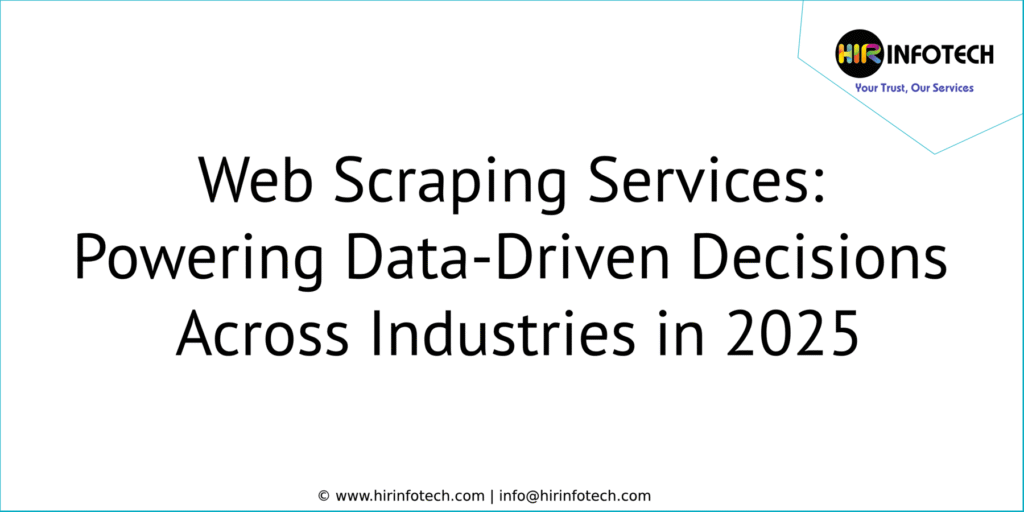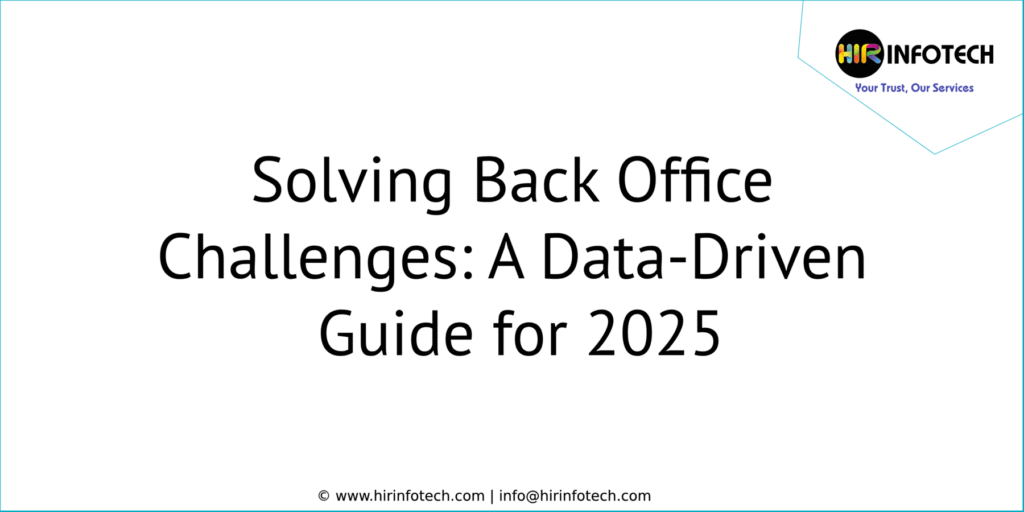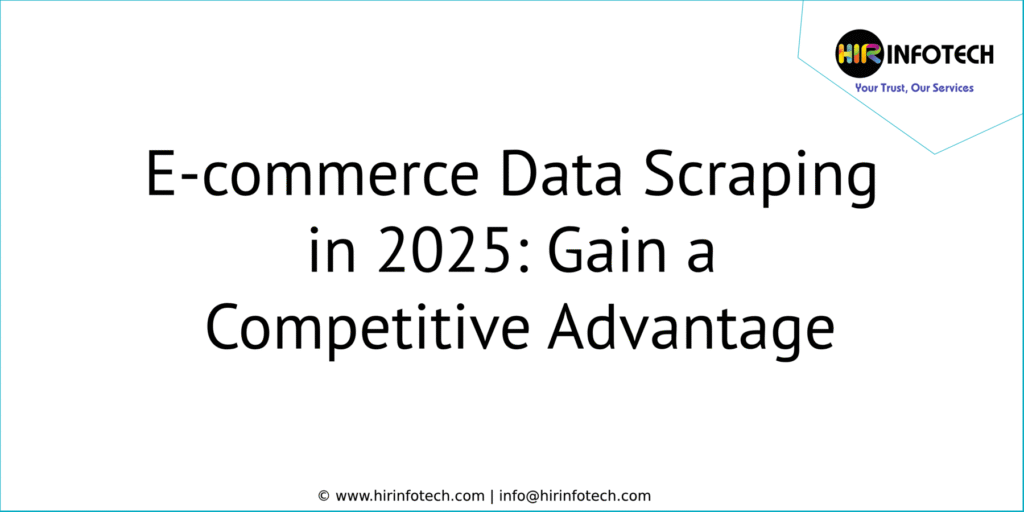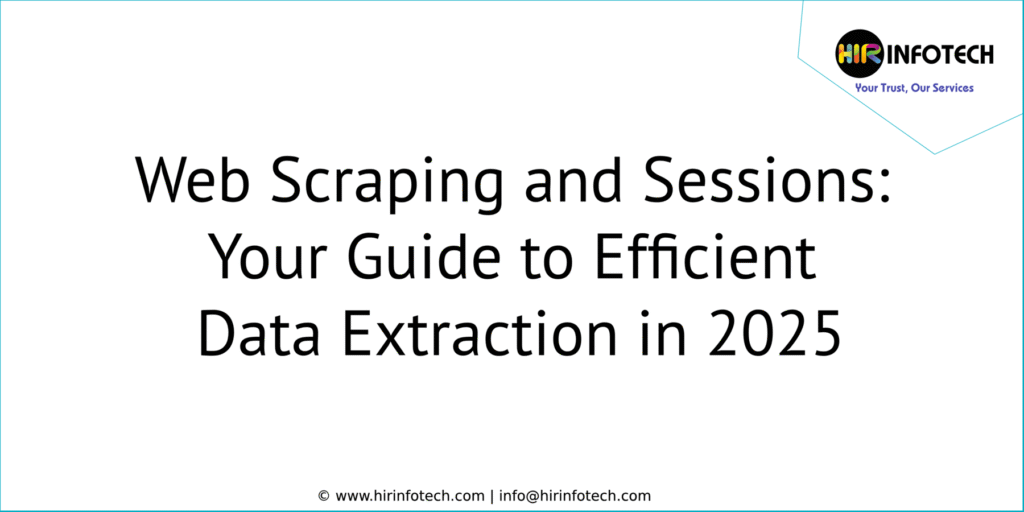
Introduction:
Businesses need data to thrive. Web scraping provides a powerful way to collect this vital information. This guide explores how different industries use web scraping in 2025. It’s designed for everyone, regardless of technical expertise. We will explore how web scraping is revolutionizing decision-making.
What is Web Scraping? (The Basics)
Web scraping is like having an automated research assistant. It extracts data from websites. This data is then organized into a usable format (like a spreadsheet or database). It’s much faster and more efficient than manual data collection.
Why Choose CustomWeb Scraping Services?
While there are “do-it-yourself” scraping tools, custom services (like those offered by Hir Infotech) offer major advantages:
- Handle Complex Websites: Many websites are difficult to scrape. Custom solutions can handle dynamic content, login requirements, and anti-scraping measures.
- Data Quality: Experts ensure the data is accurate, complete, and up-to-date.
- Scalability: Collect large volumes of data from many sources.
- Maintenance: Websites change. A custom service will update the scraper as needed.
- Legal Compliance: Experts ensure your scraping activities are ethical and legal.
- Time Savings: Focus on using the data, not collecting it.
- Integration: Integrate scraped data with your systems (CRM, databases, etc.)
Web Scraping Applications by Industry: Real-World Examples (2025)
Let’s explore how different industries are using web scraping to gain a competitive edge:
1. E-commerce and Retail:
- Key Use Cases:
- Price Monitoring: Track competitor pricing in real-time. Adjust your prices dynamically to maximize profits.
- Product Assortment Analysis: See what products your competitors are offering. Identify gaps in your own product line.
- Customer Review Analysis: Understand customer sentiment towards your products and your competitors’ products. Identify areas for improvement.
- Inventory Tracking: Monitor competitor inventory levels. Avoid stockouts and anticipate demand.
- New Product Discovery: Identify trending products and emerging market opportunities.
- Top Websites to Scrape:
- Amazon
- eBay
- Walmart
- Target
- Etsy
- AliExpress
- Specialty e-commerce sites in your niche
- Example: An online clothing retailer scrapes Amazon to track the prices of similar products. They use this data to set competitive prices and identify popular styles.
2. Real Estate:
- Key Use Cases:
- Property Valuation: Track property prices and market trends. Estimate property values more accurately.
- Lead Generation: Identify potential sellers (e.g., “For Sale By Owner” listings).
- Investment Analysis: Find undervalued properties and assess investment opportunities.
- Rental Market Analysis: Track rental rates, vacancy rates, and tenant demographics.
- Competitor Analysis: Monitor the listings and activities of other real estate agents or agencies.
- Top Websites to Scrape:
- Zillow
- Realtor.com
- Redfin
- Trulia
- Apartments.com
- Local MLS (Multiple Listing Service) websites
- Example: A real estate investor scrapes Zillow to find properties that are listed below market value in a specific neighborhood.
3. Finance and Investment:
- Key Use Cases:
- Stock Market Data: Track stock prices, trading volume, company news, and financial statements.
- Economic Indicators: Monitor economic data (GDP, inflation, interest rates) from government websites.
- Alternative Data: Gather non-traditional data (social media sentiment, news articles, satellite imagery) to gain unique investment insights.
- Risk Management: Assess credit risk and identify potential market downturns.
- Algorithmic Trading: Power automated trading systems with real-time data.
- Top Websites to Scrape:
- Yahoo Finance
- Google Finance
- Bloomberg
- SEC.gov (EDGAR)
- Financial news websites
- Company websites
- (Ethically sourced) alternative data providers
- Example: Alternative data use cases are growing in finance. A hedge fund scrapes news articles and social media to gauge public sentiment towards a particular company.
4. Travel and Hospitality:
- Key Use Cases:
- Price Comparison: Track hotel room rates, flight prices, and vacation package deals across multiple websites.
- Review Analysis: Understand customer sentiment towards hotels, airlines, and travel destinations.
- Demand Forecasting: Predict travel demand based on historical data and current trends.
- Competitor Analysis: Monitor competitor pricing, promotions, and offerings.
- Destination Research: Gather information about popular tourist destinations, attractions, and activities.
- Top Websites to Scrape:
- Booking.com
- Expedia
- TripAdvisor
- Airbnb
- Kayak
- Airline websites
- Hotel websites
- Example: A travel agency scrapes flight prices from multiple airlines to offer the best deals to their customers.
5. Marketing and Advertising:
- Key Use Cases:
- Lead Generation: Identify potential customers and gather contact information.
- Competitor Analysis: Track competitor marketing campaigns, social media activity, and advertising strategies.
- SEO Research: Identify keywords, analyze search engine rankings, and discover backlink opportunities.
- Content Marketing: Find trending topics and analyze top-performing content in your industry.
- Social Media Monitoring: Track brand mentions, customer sentiment, and influencer activity.
- Top Websites to Scrape:
- LinkedIn (for B2B leads)
- Industry directories
- Competitor websites
- Social media platforms (with careful attention to terms of service)
- News websites and blogs
- Example: A marketing agency scrapes LinkedIn to find marketing managers at companies in their target market.
6. Human Resources and Recruitment:
- Key Use Cases:
- Job Posting Analysis: Track job openings, required skills, and salary ranges.
- Candidate Sourcing: Identify potential candidates on LinkedIn and other professional networking sites.
- Salary Benchmarking: Compare salaries for different roles and locations.
- Talent Pool Analysis: Understand the availability of skilled professionals in specific areas.
- Top Websites to Scrape:
- Indeed
- Glassdoor
- Monster
- Company websites (career pages)
- Example: A recruitment firm scrapes job postings to identify companies that are hiring for specific roles.
7. Healthcare:
- Key Use Cases:
- Drug Information: Gather details on medications.
- Clinical Trials: Monitor ongoing research.
- Public Health Data: Track disease outbreaks.
- Provider Directories: Find healthcare professionals.
- Medical Literature Extract scientific papers and abstracts.
- Top Websites to Scrape:
- WebMD (for general health information, not personal medical records)
- PubMed (for biomedical literature)
- CDC.gov (for public health data)
- FDA.gov (for drug information)
- Hospital and clinic websites (for provider directories)
- Note: Be extremely cautious when scraping healthcare data. Prioritize ethical considerations and avoid personal health information.
- Example: A pharmaceutical company scrapes PubMed to identify new research publications related to a specific disease.
8. Manufacturing and Supply Chain:
- Key Use Cases:
- Supplier Discovery: Find potential suppliers and gather contact information.
- Material Pricing: Track the prices of raw materials and components.
- Inventory Monitoring: Monitor competitor inventory levels (if publicly available).
- Supply Chain Risk Management: Identify potential disruptions to the supply chain.
- Top Websites to Scrape:
- Industry directories (e.g., Thomasnet)
- Supplier websites
- Online marketplaces
- News websites and industry publications
- Example: A manufacturing company scrapes supplier websites to track the prices of raw materials.
9. Education:
- Key Use Cases:
- Course Information: Gather details on courses, programs, and tuition fees.
- Research Publications: Track academic research and publications.
- University Rankings: Monitor university rankings and performance metrics.
- Faculty Profiles: Collect information on professors and researchers.
- Top Websites to Scrape: * University websites * Online course platforms (e.g., Coursera, edX) * Academic databases (e.g., JSTOR, Scopus) * ResearchGate
- Example: A university scrapes competitor websites to compare course offerings and tuition fees.
10. Government and Public Sector:
- Key Use Cases:
- Public Data: Access publicly available government data (e.g., census data, economic statistics, environmental data).
- Policy Monitoring: Track changes in regulations and legislation.
- Public Opinion Analysis: Gauge public sentiment on policy issues.
- Top Websites to Scrape:
- Data.gov (US)
- Census.gov (US)
- BLS.gov (US)
- Open data portals of specific cities/states/countries
- Websites of government agencies and departments
- Example: A non-profit organization scrapes government websites to gather data on environmental regulations.
11. News and Media Monitoring:
- Key Use Cases:
- Track News: Monitor news articles and blog for specific keywords.
- Sentiment Analysis: Understand public opinions.
- Identify Trends: Discover emerging topics.
- Brand Monitoring: Track mentions of your company.
- Top Websites to Scrape: * Google News * Major news outlets (e.g., New York Times, BBC, CNN) * Industry-specific news websites and blogs
- Example: A public relations firm scrapes news websites to track mentions of their clients.
12. Automotive Industry
- Key Use Cases:
- Vehicle Data: Specs, features, and pricing.
- Competitor Analysis: Track competitor models.
- Market Trends: Identify popular vehicles.
- Customer Reviews: Understand customer preferences.
- Used Car Market: Monitor pricing and availability.
- Top Websites to Scrape:
- Manufacturer websites
- Online car marketplaces (e.g., Edmunds, Kelley Blue Book)
- Review sites
- Automotive news sites
- Example: A car dealership scrapes competitor websites to compare pricing and inventory.
Ethical and Legal Best Practices (Reinforcement)
- Always Check Terms of Service: Prohibition of scraping? Respect that.
- Robots.txt is Your Guide: Follow the rules outlined in the website’s robots.txt file.
- Scrape at a Reasonable Pace: Don’t overload websites. Use delays.
- Protect Personal Data: Comply with GDPR, CCPA, and other privacy laws.
- Identify Yourself: Use a clear User-Agent string.
- Use Proxies: Distribute requests across multiple IP addresses.
Frequently Asked Questions (FAQs)
1. Is web scraping legal?
Generally, yes, if you scrape publicly available data, respect website terms of service, and comply with data privacy laws. It’s a complex area; seek legal advice if you have concerns.
2. How can I avoid getting blocked?
Use proxies, rotate user agents, implement delays, and follow the website’s robots.txt file. A custom scraping service is best equipped to handle these.
3. What programming language is best for web scraping?
Python is the most popular due to its excellent libraries (Beautiful Soup, Scrapy, Selenium).
4. What’s the difference between web scraping and an API?
An API (Application Programming Interface) is a structured way for a website to provide data. Web scraping extracts data directly from the HTML. APIs are preferred if available.
5. How much does a custom web scraping service cost?
The cost varies depending on project complexity, data volume, and frequency. Contact Hir Infotech for a custom quote.
6. How do I handle JavaScript-heavy websites?
Use Selenium or a similar tool to render the JavaScript before scraping.
7. What is data cleaning, and why is it important?
Data cleaning is the process of fixing errors and inconsistencies in scraped data to ensure its accuracy and reliability.
Unlock the power of web scraping for your industry. Hir Infotech provides expert, custom web scraping services. We deliver high-quality, actionable data tailored to your specific needs. Contact us today for a free consultation and let’s discuss how we can help you achieve your data-driven goals!



